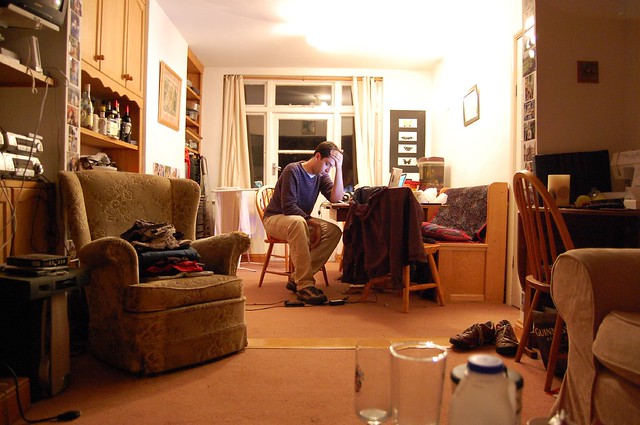You know, on one level, I just want to say "fuck everything", hold up my hands and walk away.
This closing piece on Groklaw is well-thought-out, considered, and gut-wrenching. "But for me, the Internet is over," Pamela Jones writes. Perhaps it should be over for many of us; as she points out, the founder of Lavabit, which shut down recently in response to an NSA search warrant, has stopped using email entirely. "If you knew what I know, you might not use it either," is the pull quote. Jesus.
This isn't about the Internet as such. It's about surveillance, for sure, and the chilling effects it has on freedom of speech, on freedom of thought, and the inevitable march we're all making to a new kind of distributed society. We're all connected to each other now, and the cat's not climbing back into the bag. Music was disrupted; movies; business. Government will obviously be disrupted by the new kind of interconnectedness we all share. Some have argued that it's happening already. In that context, it should be no wonder that all of this is going on. The change is inevitable, of course, just as the disruption of the entertainment industry was inevitable, but we're dealing with powerful structures.
We're all making it easy to be surveilled, by placing our data into silos, and putting so much of it on the Internet at all. Moore's Law was the only real limit to mass surveillance, and we're there. We're awash with data. Phone calls are routed over IP. How many of us send personal letters anymore? Not that it matters, because guess what, that's being logged too. (And sure, most of these news stories are coming out of the US, but don't let that fool you. We've see stories from elsewhere, too, and we know that the different agencies share information with each other.)
"Friends don't let friends use cleartext," my friend Marcus Povey writes. I'd argue that friends don't let friends put their trust in algorithms that can be backdoored, socially engineered and compromised without our knowledge.
I no longer buy the idea that we can code our way out of this. Not entirely.
Here are two things I would love for everyone to do; I'll start. The first is to publicly declare the jurisdiction in which you live, and in which your data is hosted. That way, people can make an informed decision about how to communicate with you. You can do it like this:
Hey, everyone! I live in California, my email is hosted by Google, I keep documents on Dropbox, and my server is hosted in Dallas, Texas.
Now you know whether to email me. And it also gives me some motivation: to move my email away from Google (hopefully with Mailpile's help, and to set myself up with something like ownCloud in place of Dropbox. (Of course, I'd declare where I hosted that, too.) I'm going to place this notice in my profile.
The second, and most important, thing is to take proactive, real-world action.
None of us can afford to be apolitical anymore, and we can't afford to be sidetracked by ridiculous political sideshowing. You might be a libertarian or a conservative; I'm a liberal who likes to call himself a social capitalist. It doesn't matter. What matters is everyone coming together, in conjunction with organizations like the EFF and the ACLU (and Open Rights Group and Liberty), and actively protesting. Get on the streets, tell your friends and neighbors what the problems are. Do it rationally and non-violently, but raise awareness however you can.
We have to learn how to play politics. There will be voices who call for revolution, or who publicly declare that playing this game is tantamount to aligning ourselves with government. I don't believe that these are productive discussions. (Although, I'll restate my belief that government will be subject to the same forces that other sectors were. The Napsterization of democracy will be good for all of us.)
Still, I think it's more practically possible to make freedom a mainstream political force again, and it seems to me that the best way we can do that is on the streets, in the real world. It's baffling to me that this should be necessary in America, whose self-labeling as "the land of the free" now seems wilfully Orwellian. Nonetheless, we need to deliver a clear message that only the politicians who actively support our civil liberties will, in turn, receive our support. The aforementioned organizations, as well as groups like Demand Progress and Restore the Fourth are already doing great work on this.
Even more than that, in our own actions, we have to conscientiously object. Buy services from countries with a good civil liberties record over countries that don't. Store offline. Opt out of services that track you for no good reason. Support anti-tracking measures, and projects that seek to put your own data under your own control. Support Manning. Support Snowden. Support journalists like Glenn Greenwald.
We get the world that we deserve. Some of our greatest minds have been focused on how to make extensive silos of data that infer things about our behavior, often without our knowledge or consent. They've disrupted music; they've disrupted movies; they've disrupted business. It would be very nice if we could all disrupt that last great gatekeeper - just enough so that the balance of power rests in equilibrium.


 Share this post
Share this post

